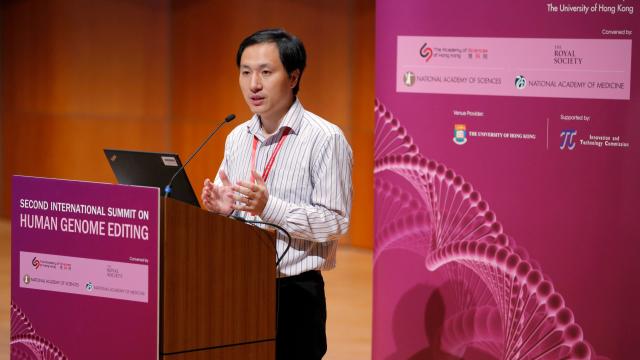An alarming study that added fuel to the fire over a recent controversial genetic experiment in China has now been invalidated. The study, which suggested that a mutation induced by Chinese scientist He Jiankui in human babies could shorten their lives, was retracted late last week, after other scientists failed to find similar results and the study’s authors admitted to a flaw in its design.
In November 2018, He Jiankui announced that he had successfully used the gene-editing technology CRISPR on a pair of twin embryos, engineering them to be born with a mutated CCR5 gene in their immune cells. The change, He said, was meant to make them resistant to infection from HIV. But He was roundly criticised by fellow colleagues and bioethicists for his experiment, which was seemingly conducted with little oversight and deeply flawed.
Among other things, He didn’t even succeed in creating the needed CCR5 mutation in both genes of one girl, meaning she would still be vulnerable to HIV, nor does the mutation protect against all strains of the virus.
In June 2019, Xinzhu Wei and Rasmus Nielsen, researchers from the University of California, Berkeley, added to the pile-on over He’s experiment. While people naturally born with the specific CCR5-mutation, called delta-32, are thought to live perfectly healthy lives, there has been some research suggesting it can lower their life expectancy, possibly by raising the risk of other infections, such as the flu.
Nielsen and Wei’s study, published in Nature Medicine that June, studied population data and found that people with both copies with the CCR5 delta-32 mutation were 21 per cent less likely to reach the age of 76.
The results galvanised other scientists to do their own work, who quickly identified some possible discrepancies. Two of these teams — one which included Nielsen and Wei — came to the conclusion that they had mistakenly undercounted the number of people with the CCR5 delta-32 mutation in their sample of UK residents.
Once they ran the numbers correctly, no link between a shorter lifespan and CCR5 delta-32 was found; a similar analysis done with different populations in Finland and Iceland also failed to turn up any connection.
Though these follow-up studies are not yet formally published or peer-reviewed, Nielsen and his team requested that their original study be retracted late last week.
“I feel I have a responsibility to put the record straight for the public,” Nielsen told Nature News.
The retraction doesn’t make He’s experiment any less unethical or dangerous, of course. There’s still the chance that something may have gone wrong during the gene-editing process that caused off-target changes to either of the twins’ genes.
At this point, there have been no public statements from the babies’ parents, nor have other scientists had the opportunity to study the raw data collected by He, who has disappeared from sight since his public unveiling of the results last November. He appears to still be in the custody of the Chinese government.
If anything, this episode serves as a lesson for why science must be done out in the open, where other experts can evaluate methods and ethics independently.
